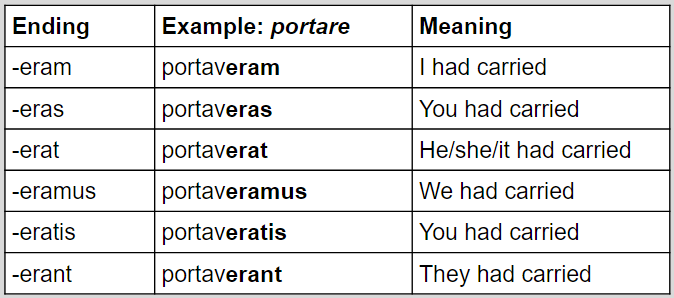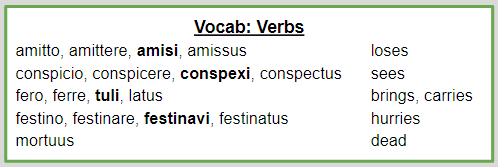Pluperfect Tense: How To Be More Than Perfect
January Latin Challenge: Day 14 of 31
Hi everyone, and welcome back to bambasbat and the January Latin Challenge!
For Day 14 we are focussing on the Pluperfect tense in Latin. My students always struggle with this one, so if you are in that group don’t worry, you’re in good company. It’s actually quite straightforward when you break it down.
The pluperfect essentially does exactly what it says on the tin - it is the “plus perfect” tense, the “more than past”. I like to call it the “extra past” tense. This is an action that had already happened in the story before the main action you are talking about.
Let’s take a look in English.
He had approached the city before the guards saw him.
The main action here is “the guards saw him”. That’s the core of the sentence, and the verb is in the perfect tense.
However, to give me more information there is also another verb: “He had approached”. This is an action that had already been completed before the main action took place.
The main thing to know about the pluperfect tense:
It is translated as HAD.
Here are some more examples in English - which are the pluperfect verbs? Be careful, there might be some red herrings.
After they had seen me they ran away.
Did you feel tired because you had walked into town?
After we have spoken the people will be happy.
I ate too much yesterday and I feel ill.
I had eaten too much the day before and felt ill.
Answers below: read on when ready.
“They ran away” is my main verb, but the extra information is “because they had seen me”. The seeing is the action that was completed before the main verb - the extra past tense.
The question is “did you feel tired”, but the condition is that “you had walked to town” before the question was asked. “You had walked” is my pluperfect.
For number 3, there is no pluperfect! I have a perfect tense, “we have spoken”, and a future tense. There is no “had” anything in my sentence, so no pluperfects.
Again for this one, I have tricked you! There is no pluperfect - the first verb is perfect, “I ate”, and the second, “I feel” is present.
In this one there is a pluperfect - “I had eaten”. This is why I felt ill. It had already happened.
How did you find that? It can be tricky to spot in English, but it is actually much easier to spot in Latin.
This is because Latin uses clear endings for the pluperfect.
The Pluperfect In Latin
To form it, you use the 3rd principal part of a Latin verb. Let’s take porto as my example - the principal parts are:
porto, portare, portavi, portatus.
Take the perfect stem, portavi. Take off the -i (which is the perfect ending) and add the pluperfect endings on.
When translating, don’t forget that “had”: I had carried etc.
Latin Example Sentences
The vocab is below the sentences, and is split into categories. I have given the principal parts for verbs (be careful, some of the verbs are very irregular). The perfect stems you are looking for, that third principal part, are in bold.
The explanations and translations are below, so don’t read on until you want to know the answers.
mortuum senatorem heri conspexeram.
frustra ex urbe festinaveratis.
senex pecuniam tulerat, sed eam amisit.
Explanations below: read on when ready
mortuum senatorem heri conspexeram.
Usually my verb is at the end in Latin, and this is the case in this sentence. conspexeram is an irregular perfect stem, and comes from conspicio as you can see in the vocab. “I had seen”.
Now I look for what I had seen - so I am looking for an accusative - I have 2 infact! One is senatorem - the senator, and the other, which is sort of an adjective, mortuum - dead (literally it comes from the verb morior, “to die”, and is a perfect participle, so it means “having died”, but we just translate it as dead) If we put them together we get “the dead senator”.
Finally we just have heri left - yesterday, So all together, “I had seen the dead senator yesterday!”
frustra ex urbe festinaveratis.
Again I look for my verb first, as it tells me the most information. festinaveratis - you (plr) had hurried.
Now I need more information. ex urbe is an ablative phrase: away from or out of the city.
frustra means “in vain” - so clearly the action was not successful in preventing some misfortune.
All together, “you had hurried from the city in vain”.
senex pecuniam tulerat, sed eam amisit.
I have two verbs here! Let’s start with the first part of the sentence.
tulerat is a weird verb - it comes from fero, meaning “bring, carry, bear”, and is formed from the perfect stem. The ending tells me its 3rd person singular pluperfect, so “he had carried” or “he had brought”.
I need a singular nominative to match, and I have senex - the old man.
What had he brought? pecuniam - money. “The old man had brought money”.
Now for the second bit. Start with sed which means “but”. A connective!
My second verb is amisit - he/she/it lost. This is just a normal perfect tense, as it has the -i, -isti, -it ending.
I don’t have another nominative, so I keep the old man as my subject, and I have eam - “it” in the accusative - this is what he lost. It is referring to the money from the first section.
So overall - “The old man had brought money, but he lost it”.
And that’s the pluperfect tense!
Don’t forget you can download a complete reference guide to Latin verbs from here. Do go and get that now, you will find it really useful to have to hand while you practise translating.
I hope you have found this post useful for understanding the pluperfect tense! Thanks for reading, and I’ll see you tomorrow on bambasbat for Day 15 of the January Latin Challenge!




